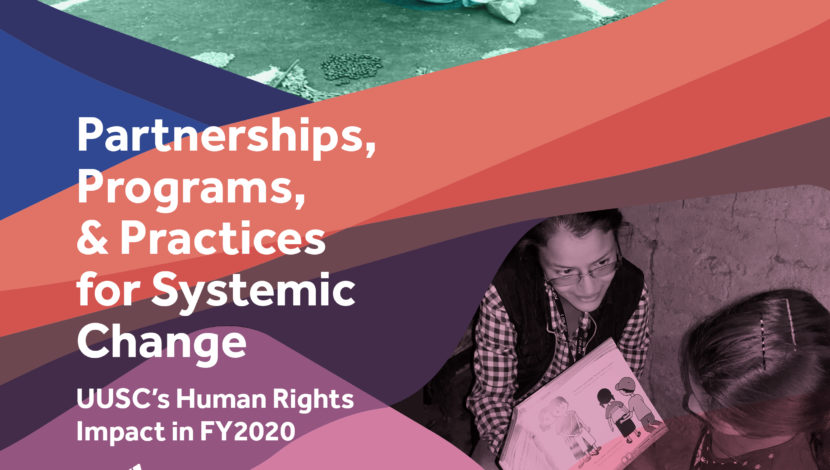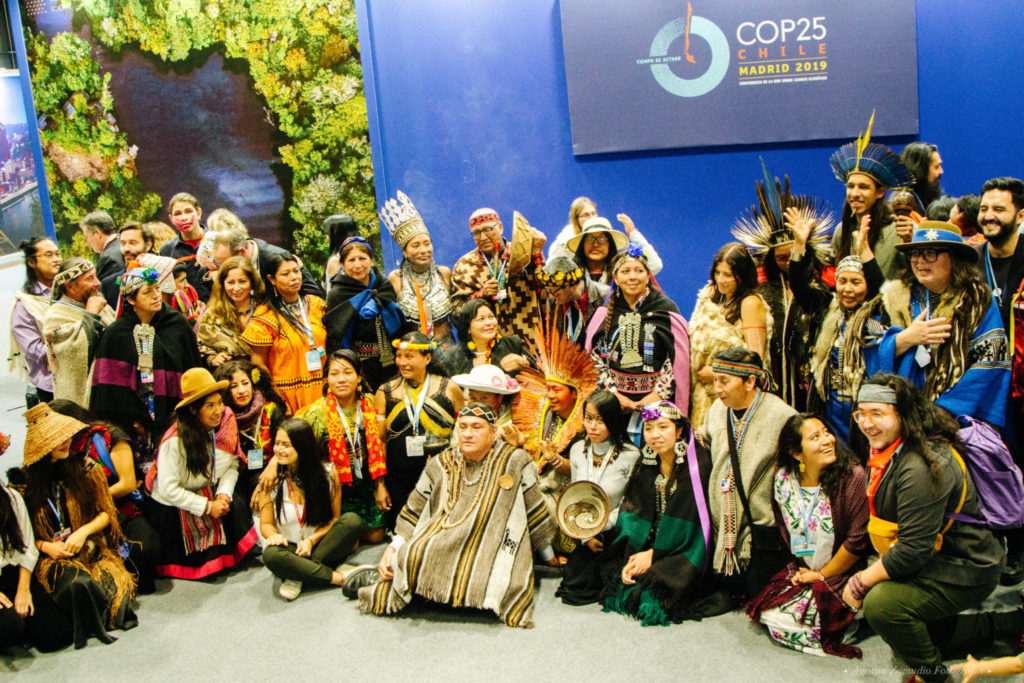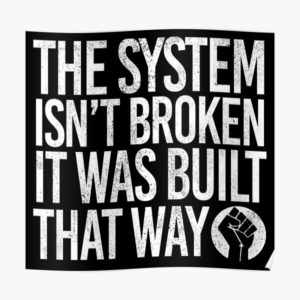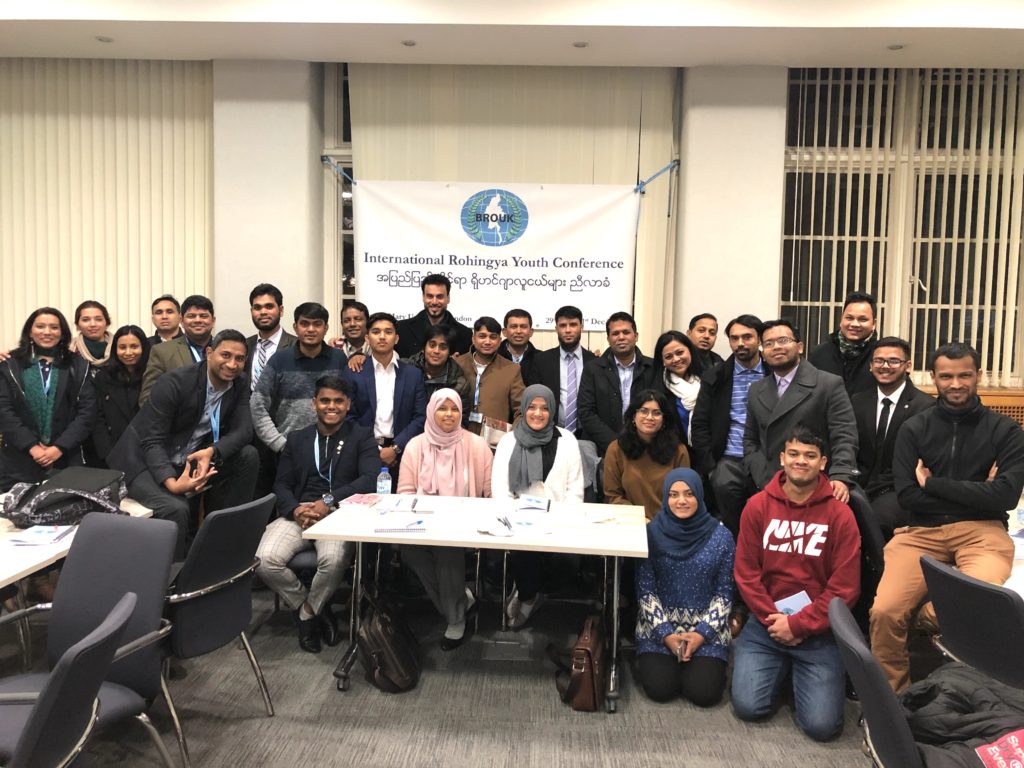The Unitarian Universalist Service Committee advances human rights through grassroots collaborations.
UUSC’s Impact for Fiscal Year 2020

As a United States-based nonprofit, we have an obligation to challenge the dominant systems that created the need for our organization’s existence in the first place. We occasionally fall short and may sometimes lose sight of this responsibility, but it is and must be our North Star. Because systemic change at the structural level is about the redistribution of wealth and power, it must be led by strong grassroots movements. Therefore, organizations like UUSC have the most impact by supporting the grassroots movements and activists around the world who are challenging systemic oppression and working towards systemic alternatives.
Last fall, UUSC released our first comprehensive impact report, using the general framework of “Strengthening Grassroots Movements for Systemic Change” to describe the impact of UUSC’s and our partners’ human rights work in 2018-19. This year’s report, highlighting our collective impacts over the course of fiscal year 2020, builds on the framing from our previous report, tying examples of our work to several specific indicators of systemic change and movement-building from the perspective of an international human rights organization and funder.
Included below are descriptions of the indicators we chose for this report, along with our analysis. The report does not attempt to evaluate or quantify. It aims to uplift concrete examples of how UUSC and our partners have engaged in the long-term work of changing systems and strengthening grassroots leaders, organizations, and movements in the pursuit of systemic change across our primary areas of work.
In the area of Migrant Justice, we learn how:
- A Nicaraguan feminist collective has developed community-based practices to support campesina farmers against the backdrop of political violence.
- UUSC’s partners, allies, and members have contributed to a grassroots movement to expand accompaniment and resist criminalization in the American South.
- UUSC and our partners continue to fight the Trump administration’s racist family separation policies while advocating for permanent protections for undocumented immigrants.
- A Guatemalan nonprofit helps reintegrate Indigenous Mayan youth separated from their families after being deported from the United States.
In the area of Climate Justice, we hear about:
- A Texas tribe’s resistance to a harmful fracked gas terminal and its ongoing advocacy and litigation against the U.S. government.
- An “alternative” space—one by and for Indigenous leaders—alongside official international climate negotiations that were abruptly moved from Chile to Spain.
- First and Indigenous peoples’ submission of a complaint to the United Nations Special Rapporteur for the Human Rights of Internally Displaced Persons.
And in the area of Crisis Response, we cover:
- The justice and accountability movement in Burma, including a burgeoning youth-led movement within the Rohingya diaspora community.

Systemic Change Indicators Used In This Report
| Systemic Change Indicator | Analysis: How Does this Indicator Relate to Systemic Change? | |
| Facilitating meaningful access to decision-making power | Historically, interlocking systems of oppression have conspired to exclude impacted communities from participating in the decisions that affect them most. Supporting their participation in key decision-making spaces is one small way we begin to address historic inequities and integrate the critical perspectives of frontline communities into policy discussions. | |
| Fostering connections to build and strengthen movements | Robust and interconnected social movements are critical to systemic change. Yet, the organizations and activists on the frontlines of this fight are often overworked, on the verge of burnout, and/or lack the resources necessary to build movements. UUSC helps fill this gap by facilitating the creation of interconnected spaces and covering the costs associated with participating in them. | |
| Providing flexible, responsive, and trust-based support | Providing flexible, responsive, and trust-based support to our grassroots partners is an example of decolonization. It recognizes the expertise of those on the frontlines and acknowledges that our partners are best positioned to determine how our support can be most useful. Their ability to change course as challenges arise and opportunities emerge is critical to our collective success. | |
| Following the leadership of those most impacted by injustice | Following the leadership of those most impacted by injustice helps build and strengthen movements and directly challenges systems of oppression by supporting the leadership of communities who have historically been denied their rights, equal access to resources, and participation in decisions affecting them and their future. Partnering with such “directly led” groups ensures that our programs and strategies have the most impact because they are informed and led by those most proximate to the harms we are addressing together. | |
| Leveraging all of our resources to go beyond the grant dollar | Achieving positive changes in the world will require the redistribution of financial resources to grassroots organizations and movements. We maximize our impact by supplementing redistributive funding with support for activism, justice education, research, and other forms of partner and movement support. | |
| Supporting grassroots solutions that challenge oppressive systems | Systemic solutions will never come from our institutions. One of the ways UUSC contributes to systemic change is by partnering with groups and movements directly confronting oppressive systems and imagining and implementing their own alternatives. | |
| Dismantling and replacing harmful laws, policies, and narratives | Changing laws, policies, and narratives are hallmarks of the kind of powerful movements necessary to change systems and immediately improve people’s lives. |
Acknowledgements & Disclaimers
None of the stories that appear in this report would exist without UUSC’s grassroots partners around the world. We understand we are actors in an ecosystem, and that our impact is interdependent. For the purposes of demonstrating UUSC’s contribution, we have situated these stories within the larger systemic change framework described above. We believe this shows how UUSC’s work can strengthen the frontline work of grassroots movements to dismantle systems of oppression over the long-term. This framing is not, however, meant to suggest that our partners necessarily articulate our support in this way.
***
The stories contained in this report highlight when UUSC has done more than solely provide financial resources. This does not imply that UUSC’s contributions were – or ever could be – as important as the work of frontline communities or our partners themselves. Ultimately, it is our partners and their communities who have the final say about our partnership and what it has meant to them and their struggles.
***
In the spring and summer of 2020, as COVID-19 continued its spread around the globe, our world changed. It changed even more as uprisings took hold to protest the police murders of George Floyd, Breonna Taylor, and so many other Black people before and after them. Much of our work and the work of our partners shifted in response, as we have adapted to new ways of living, working, and being.

The responses of Black-led movements to the most recent examples of state-sanctioned violence against their communities highlight the clear connection between the long-term organizing of grassroots movements and the potential for systemic change.
Both crises and the responses thereto have reaffirmed our approach to the work and the way we frame our impact—even as we continue to make meaning of them and reckon with how we are called to respond. Our response must include, first and foremost, an earnest examination of our own complicity in the systems of white supremacy and colonialism. Then, we must begin to dismantle the policies and practices that perpetuate these systems within our institutions. This work is complicated, without a clear endpoint or guide, and must go beyond public statements and institutional commitments (including this one!). It is also work that is long overdue both in our sector and at UUSC.
Finally, the descriptions in this report borrow liberally from the written reports of our partners and UUSC staff. Without those descriptions, this report would not be possible. Thank you to everyone who contributed to it, knowingly or otherwise!
